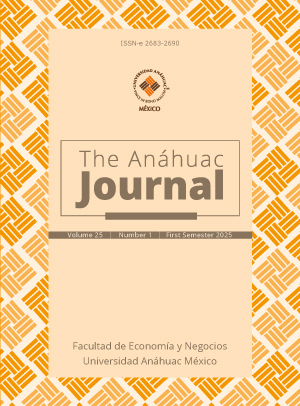Impacto del desempeño ASG en la rentabilidad de las empresas del mercado MILA: el rol moderador de la composición del directorio
DOI:
https://doi.org/10.36105/theanahuacjour.2025v25n1.2845Palabras clave:
puntuaciones ESG, composición de directorio, gobierno corporativo, comité de sostenibilidad, mercado MILAResumen
El estudio examina la relación entre las puntuaciones ESG y la rentabilidad empresarial, centrándose en los efectos moderadores de la composición del directorio y la presencia de un comité de sostenibilidad. Para el estudio se utilizó un análisis de regresión de datos de panel, basado en datos del Dow Jones Sustainability Index MILA Pacific Alliance y los informes anuales de 56 empresas «Best in Class» de 2020 a 2022. Los resultados revelan un impacto positivo y significativo de las puntuaciones ambientales y sociales ESG en el ROA y de las puntuaciones ambientales y de gobernanza en el ROE. Además, la presencia de mujeres en los consejos modera significativamente la relación entre las puntuaciones ESG y el ROA y el ROE. El tamaño del consejo y la independencia moderan de forma significativa la relación entre la puntuación ESG de gobernanza y el ROE. Asimismo, el comité de sostenibilidad también modera positivamente la relación entre las puntuaciones ESG medioambientales y el ROE. Este estudio contribuye a la literatura sobre la relación entre criterios ASG y rentabilidad, destacando el papel moderador del gobierno corporativo, como aporte para las empresas latinoamericanas en su involucramiento con el desarrollo sostenible.
Descargas
Referencias
Ademi, B., & Klungseth, N. J. (2022). Does it Pay to Deliver Superior ESG Performance? Evidence from US S&P 500 Companies. Journal of Global Responsibility, 17(4), 421– 449. https://doi.org/10.1108/jgr-01-2022-0006 DOI: https://doi.org/10.1108/JGR-01-2022-0006
Ahmad, S., Mohti, W., Khan, M., Irfan, M., & Bhatti, O. K. (2024). Creating a Bridge Between ESG and Firm’s Financial Performance in Asian Emerging Markets: Catalytic Role of Managerial Ability and Institutional Quality. Journal of Economic and Administrative Sciences. Vol. ahead-of-print. https://doi.org/10.1108/JEAS-01-2024-0004 DOI: https://doi.org/10.1108/JEAS-01-2024-0004
Alahdal, W. M., Hashim, H. A., Almaqtari, F. A., Salleh, Z., & Pandey, D. K. (2024). The Moderating Role of Board Gender Diversity in ESG and Firm Performance: Empirical Evidence from Gulf Countries. Business Strategy & Development, 7(3), e70004. https://doi.org/10.1002/bsd2.70004 DOI: https://doi.org/10.1002/bsd2.70004
Alareeni, B. A., & Hamdan, A. (2020). ESG Impact on Performance of US S&P 500-Listed Firms. Corporate Governance, 20(7), 1409-1428. https://doi.org/10.1108/cg-06-2020-0258 DOI: https://doi.org/10.1108/CG-06-2020-0258
Albitar, K., Hussainey, K., Kolade, N., & Gerged, A. M. (2020). ESG Disclosure and Firm Performance before and after IR: The Moderating Role of Governance Mechanisms. International Journal of Accounting & Information Management, 28(3), 429-444. https://doi.org/10.1108/ijaim-09-2019-0108 DOI: https://doi.org/10.1108/IJAIM-09-2019-0108
Alfalih, A. A. (2022). ESG Disclosure Practices and Financial Performance: a General and Sector Analysis of SP-500 Non-Financial Companies and the Moderating Effect of Economic Conditions. Journal of Sustainable Finance & Investment, 13(4), 1506-1533. https://doi.org/10.1080/20430795.2022.2150511 DOI: https://doi.org/10.1080/20430795.2022.2150511
Alodat, A. Y., Salleh, Z., Nobanee, H., & Hashim, H. A. (2023). Board Gender Diversity and Firm Performance: The Mediating Role of Sustainability Disclosure. Corporate Social Responsibility and Environmental Management, 30(4), 2053-2065. https://doi.org/10.1002/csr.2473 DOI: https://doi.org/10.1002/csr.2473
Alodat, A. Y., & Hao, Y. (2025). Environmental, Social and Governance (ESG) Disclosure and Firm Performance: Moderating Role of Board Gender Diversity and Sustainability Committee. Sustainable Development, 33(1), 636-651. https://doi.org/10.1002/sd.3126 DOI: https://doi.org/10.1002/sd.3126
Alsayegh, M. F., Abdul Rahman, R., & Homayoun, S. (2020). Corporate Economic, Environmental, and Social Sustainability Performance Transformation through ESG Disclosure. Sustainability, 12(9), 3910. https://doi.org/10.3390/su12093910 DOI: https://doi.org/10.3390/su12093910
Atan, R., Alam, M. M., Said, J., & Zamri, M. (2018). The Impacts of Environmental, Social, and Governance Factors on Firm Performance: Panel Study of Malaysian Companies. Management of Environmental Quality: An International Journal, 29(2), 182-194. https://doi.org/10.1108/meq-03-2017-0033 DOI: https://doi.org/10.1108/MEQ-03-2017-0033
Ayuso, S., Rodríguez, M. A., García-Castro, R., & Ariño, M. A. (2014). Maximizing Stakeholders’ Interests: An Empirical Analysis of the Stakeholder Approach to Corporate Governance. Business & Society, 53(3), 414–439. https://doi.org/10.1177/0007650311433122 DOI: https://doi.org/10.1177/0007650311433122
Baraibar-Diez, E., & D. Odriozola, M. (2019). CSR Committees and Their Effect on ESG Performance in UK, France, Germany, and Spain. Sustainability, 11(18), 5077. https://doi.org/10.3390/su11185077 DOI: https://doi.org/10.3390/su11185077
Bollaín Parra, L., de la Torre Torres, O. V., & Martínez Torre-Enciso, M. I. (2022). Demostración del beneficio de una mayor participación de la mujer en el consejo de administración y la alta dirección de las empresas mexicanas que cotizan en bolsa. Contaduría y Administración, 67(4), 229-254. https://doi.org/10.22201/fca.24488410e.2022.4813 DOI: https://doi.org/10.22201/fca.24488410e.2022.4813
Bruna, M. G., Loprevite, S., Raucci, D., Ricca, B., & Rupo, D. (2022). Investigating the Marginal Impact of ESG Results on Corporate Financial Performance. Finance Research Letters, 47, 102828. https://doi.org/10.1016/j.frl.2022.102828 DOI: https://doi.org/10.1016/j.frl.2022.102828
Buallay, A. (2019). Is Sustainability Reporting (ESG) Associated with Performance? Evidence from the European Banking Sector. Management of Environmental Quality: An International Journal, 30(1), 98-115. https://doi.org/10.1108/MEQ-12-2017-0149 DOI: https://doi.org/10.1108/MEQ-12-2017-0149
Chahuán-Jiménez, K. (2020). Correlation between the DJSI Chile and the Financial Indices of Chilean Companies. International Journal of Financial Studies, 8(4), 74. https://doi.org/10.3390/ijfs8040074 DOI: https://doi.org/10.3390/ijfs8040074
Chen, S., Song, Y., & Gao, P. (2023). Environmental, Social, and Governance (ESG) Performance and Financial Outcomes: Analyzing the Impact of ESG on Financial Performance. Journal of Environmental Management, 345, 118829. https://doi.org/10.1016/j.jenvman.2023.118829 DOI: https://doi.org/10.1016/j.jenvman.2023.118829
Cherian, S. & Seranmadevi, R. (2024). Does ESG Integration Enhance Financial Performance in Emerging Economies? A Systematic Review of Brics. In: Hamdan, A. (ed.), Achieving Sustainable Business through AI, Technology Education and Computer Science. Springer. https://doi.org/10.1007/978-3-031-70855-8_33 DOI: https://doi.org/10.1007/978-3-031-70855-8_33
Da Silva, F. E., & Mascena, K. M. C. de. (2024). The Relationship Between ESG and Financial Performance in Brazilian Companies. Revista De Administração Da UFSM, 17(4), e3. https://doi.org/10.5902/1983465986555 DOI: https://doi.org/10.5902/1983465986555
Delgado-Ceballos, J., Ortiz-De-Mandojana, N., Antolín-López, R., & Montiel, I. (2022). Connecting the Sustainable Development Goals to Firm-Level Sustainability and ESG Factors: The Need for Double Materiality. BRQ Business Research Quarterly, 26(1), 2-10. https://doi.org/10.1177/23409444221140919 DOI: https://doi.org/10.1177/23409444221140919
Díaz-Becerra, Ó., Castañeda-Moreano, R., & Rodríguez-Cairo, V. (2024). Dow Jones Sustainability MILA Pacific Alliance Index and Financial Performance of Latin America Integrated Market. Journal of Financial Reporting and Accounting, Vol. ahead-of-print. https://doi.org/10.1108/JFRA-09-2023-0524 DOI: https://doi.org/10.1108/JFRA-09-2023-0524
Disli, M., Yilmaz, M. K., & Mohamed, F. F. M. (2022). Board Characteristics and Sustainability Performance: Empirical Evidence from Emerging Markets. Sustainability Accounting, Management and Policy Journal, 13(4), 929-952. https://doi.org/10.1108/SAMPJ-09-2020-0313 DOI: https://doi.org/10.1108/SAMPJ-09-2020-0313
Duque-Grisales, E., & Aguilera-Caracuel, J. (2021). Environmental, Social and Governance (ESG) Scores and Financial Performance of Multilatinas: Moderating Effects of Geographic International Diversification and Financial Slack. Journal of Business Ethics, 168, 315–334. https://doi.org/10.1007/s10551-019-04177-w DOI: https://doi.org/10.1007/s10551-019-04177-w
Elmghaamez, I. K., Nwachukwu, J., & Ntim, C. G. (2024). ESG Disclosure and Financial Performance of Multinational Enterprises: The Moderating Effect of Board Standing Committees. International Journal of Finance & Economics, 29(3), 3593-3638. https://doi.org/10.1002/ijfe.2846 DOI: https://doi.org/10.1002/ijfe.2846
Galbreath, J. (2018a). Do Boards of Directors Influence Corporate Sustainable Development? An Attention-Based Analysis. Business Strategy and the Environment, 27(6), 742-756. https://doi.org/10.1002/bse.2028 DOI: https://doi.org/10.1002/bse.2028
Galbreath, J. (2018b). Is Board Gender Diversity Linked to Financial Performance? The Mediating Mechanism Of CSR. Business & Society, 57(5), 863–889. https://doi.org/10.1177/0007650316647967 DOI: https://doi.org/10.1177/0007650316647967
Gillan, S. L., Koch, A., & Starks, L. T. (2021). Firms and Social Responsibility: A Review of ESG and CSR Research in Corporate Finance. Journal of Corporate Finance, 66, 101889. https://doi.org/10.1016/j.jcorpfin.2021.101889 DOI: https://doi.org/10.1016/j.jcorpfin.2021.101889
Huang, D.Z.X., 2021. Environmental, Social and Governance (ESG) Activity and Firm Performance: A Review and Consolidation. Accounting & Finance, 61, 335–360. https://doi.org/10.1111/acfi.12569 DOI: https://doi.org/10.1111/acfi.12569
Hussain, M. A., Alsayegh, M. F., & Boshnak, H. A. (2024). The Impact of Environmental, Social, and Governance Disclosure on the Performance of Saudi Arabian Companies: Evidence from the Top 100 Non-Financial Companies Listed on Tadawul. Sustainability, 16(17), 7660. https://doi.org/10.3390/su16177660 DOI: https://doi.org/10.3390/su16177660
Jensen, M. C. (2002). Value Maximization, Stakeholder Theory, and the Corporate Objective Function. Business Ethics Quarterly, (12)2, 235-256. https://doi.org/10.2307/3857812 DOI: https://doi.org/10.2307/3857812
Jung, H. (2024). The Moderating Effect of Board Characteristics in The Relationship Between ESG and Corporate Financial Performance. Studies in Business and Economics,19(2), 110-119. https://doi.org/10.2478/sbe-2024-0028 DOI: https://doi.org/10.2478/sbe-2024-0028
Kahloul, I., Sbai, H., & Grira, J. (2022). Does Corporate Social Responsibility Reporting Improve Financial Performance? The Moderating Role of Board Diversity and Gender Composition. The Quarterly Review of Economics and Finance, 84, 305–314. https://doi.org/10.1016/j.qref.2022.03.001 DOI: https://doi.org/10.1016/j.qref.2022.03.001
Keter, C. K. S., Cheboi, J. Y., Kosgei, D., & Chepsergon, A. K. (2023). Financial Performance and Firm Value of Listed Companies: Financial Performance Measure ROA versus ROE. Journal of Business, Economics and Management Research Studies, 1(4), 1-11. https://blueprintacademicpublishers.com/index.php/JOBEMRS/article/view/78
Khan, A., Afeef, M., Ilyas, M., & Jan, S. (2024). Does CSR Committee Drive the Association between Corporate Social Responsibility and Firm Performance? International Evidence. Managerial Finance, 50 (1), 50-74. https://doi.org/10.1108/MF-10-2022-0508 DOI: https://doi.org/10.1108/MF-10-2022-0508
Larrinaga, C. (2023). Sustainability Accounting: ESG Approaches Are Not Enough. Revista Contabilidade & Finanças, 34(91), e9042. https://doi.org/10.1590/1808-057x20239042.en DOI: https://doi.org/10.1590/1808-057x20239042.en
Li, H., & Chen, P. (2018). Board Gender Diversity and Firm Performance: The Moderating Role of Firm Size. Business Ethics: A European Review, 27(4), 294-308. https://doi.org/10.1111/beer.12188 DOI: https://doi.org/10.1111/beer.12188
Mastella, M., Vancin, D., Perlin, M., & Kirch, G. (2021). Board Gender Diversity: Performance and Risk of Brazilian Firms. Gender in Management, 36(4), 498-518. https://doi.org/10.1108/GM-06-2019-0088 DOI: https://doi.org/10.1108/GM-06-2019-0088
Naciti, V., Cesaroni, F. & Pulejo, L. (2022). Corporate Governance and Sustainability: A Review of the Existing Literature. Journal of Management and Governance, 26, 55–74. https://doi.org/10.1007/s10997-020-09554-6 DOI: https://doi.org/10.1007/s10997-020-09554-6
Naeem, N., Cankaya, S., & Bildik, R. (2022). Does ESG Performance Affect the Financial Performance of Environmentally Sensitive Industries? A Comparison between Emerging and Developed Markets. Borsa Istanbul Review, 22, S128-S140. https://doi.org/10.1016/j.bir.2022.11.014 DOI: https://doi.org/10.1016/j.bir.2022.11.014
Narula, R., Rao, P., Kumar, S., & Matta, R. (2024). ESG Scores and Firm PerformanceEvidence from Emerging Market. International Review of Economics & Finance, 89, 1170-1184. https://doi.org/10.1016/j.iref.2023.08.024 DOI: https://doi.org/10.1016/j.iref.2023.08.024
Nicolò, G., Zampone, G., Sannino, G., & de Iorio, S. (2022). Sustainable Corporate Governance and Non-Financial Disclosure in Europe: Does the Gender Diversity Matter? Journal of Applied Accounting Research, 23(1), 227-249. https://doi.org/10.1108/JAAR-04-2021-0100 DOI: https://doi.org/10.1108/JAAR-04-2021-0100
Orazalin, N., Kuzey, C., Uyar, A., & Karaman, A. S. (2024). Does CSR Contribute to the Financial Sector’s Financial Stability? The Moderating Role of a Sustainability Committee. Journal of Applied Accounting Research, 25(1), 105-125. https://doi.org/10.1108/JAAR-12-2022-0329 DOI: https://doi.org/10.1108/JAAR-12-2022-0329
Ospina-Patiño, C., González-Ruiz, J. D., & Marín-Rodríguez, N. J. (2023). Sustainable Practices and Financial Performance in Latin America: An Analysis of Environmental Scores. Revista CEA, 9(21), 1-29. https://doi.org/10.22430/24223182.2792 DOI: https://doi.org/10.22430/24223182.2792
Palacin-Bossa, G. D., Alvear-Montoya, L. G., & Macías-Jiménez, M. A. (2024). Exploring the Relationship between ESG, Financial Performance, and Corporate Reputation Using ANOVA: The Case of Colombian Companies. Procedia Computer Science, 241, 552-557. https://doi.org/10.1016/j.procs.2024.08.079 DOI: https://doi.org/10.1016/j.procs.2024.08.079
Porter M., & Kramer M. (2011). Creating Shared Value. Harvard Business Review, 89(1/2), 62-77. https://hbr.org/2011/01/the-big-idea-creating-shared-value
Possebon, E. A. G., Cippiciani, F. A., Savoia, J. R. F., & de Mariz, F. (2024). ESG Scores and Performance in Brazilian Public Companies. Sustainability, 16(13), 5650. https://doi.org/10.3390/su16135650 DOI: https://doi.org/10.3390/su16135650
Qureshi, M. A., Kirkerud, S., Theresa, K., & Ahsan, T. (2020). The Impact of Sustainability (Environmental, Social, and Governance) Disclosure and Board Diversity on Firm Value: The Moderating Role of Industry Sensitivity. Business Strategy and the Environment, 29(3), 1199–1214. https://doi.org/10.1002/bse.2427 DOI: https://doi.org/10.1002/bse.2427
Rossi, M., Chouaibi, J., Chouaibi, S., Jilani, W., & Chouaibi, Y. (2021). Does a Board Characteristic Moderate the Relationship between CSR Practices and Financial Performance? Evidence from European ESG Firms. Journal of Risk and Financial Management, 14(8), 354. https://doi.org/10.3390/jrfm14080354 DOI: https://doi.org/10.3390/jrfm14080354
S&P Dow Jones Indices. (2017). S&P Dow Jones Indices, Robecosam, IFC y MILA lanzan el Índice Dow Jones Sustainability MILA Pacific Alliance. https://www.spglobal.com/spdji/es/documents/index-news-and-announcements-lls/20171018-djsimila-sp.pdf
S&P Dow Jones Indices. (2022). Dow Jones Best-in-Class MILA Pacific Alliance Index. March. Retrieved March, 2022. https://www.spglobal.com/spdji/en/indices/sustainability/dow-jones-best-in-class-mila-pacific-alliance-index/#data
Sanches Garcia, A., & Orsato, R. J. (2020). Testing the Institutional Difference Hypothesis: A Study about Environmental, Social, Governance, and Financial Performance. Business Strategy and the Environment, 29(8), 3261-3272. https://doi.org/10.1002/bse.2570 DOI: https://doi.org/10.1002/bse.2570
Șerban, R. A., Mihaiu, D. M., & Țichindelean, M. (2022). Environment, Social, and Governance Score and Value Added Impacts on Market Capitalization: A Sectoral-Based Approach. Sustainability, 14(4), 2069. https://doi.org/10.3390/su14042069 DOI: https://doi.org/10.3390/su14042069
Sharawi, H., Al-Zahrani, H., & Al-Asmari, A. (2024). The Moderating Effect of Board Characteristics in the Relationship Between ESG Disclosure and Financial Performance: Evidence from KSA, Educational Administration: Theory and Practice, 30(7) 1055-1067. https://doi.org/10.53555/kuey.v30i7.6944 DOI: https://doi.org/10.53555/kuey.v30i7.6944
Uyar, A., Kuzey, C., Kilic, M., & Karaman, A. S. (2021). Board Structure, Financial Performance, Corporate Social Responsibility Performance, CSR Committee, and CEO Duality: Disentangling the Connection in Healthcare. Corporate Social Responsibility and Environmental Management, 28(6), 1730-1748. https://doi.org/10.1002/csr.2141 DOI: https://doi.org/10.1002/csr.2141
Velte, P. (2017). Does ESG Performance Have an Impact on Financial Performance? Evidence from Germany. Journal of Global Responsibility, 8(2), 169-178. https://doi.org/10.1108/JGR-11-2016-0029 DOI: https://doi.org/10.1108/JGR-11-2016-0029
Waddock, S.E. & Graves, S.B. (1997). The Corporate Social Performance-Financial Performance Link. Strategic Management Journal, 18(4), 303-319. https://doi.org/10.1002/(SICI)1097-0266(199704)18:4%3C303::AID-SMJ869%3E3.0.CO;2-G DOI: https://doi.org/10.1002/(SICI)1097-0266(199704)18:4<303::AID-SMJ869>3.0.CO;2-G

Descargas
Publicado
Número
Sección
Licencia
Derechos de autor 2025 Universidad Anáhuac del Sur

Esta obra está bajo una licencia internacional Creative Commons Atribución-NoComercial-CompartirIgual 4.0.
The Anáhuac Journal se distribuye bajo Licencia Creative Commons Atribución-NoComercial-CompartirIgual 4.0 Internacional.





























